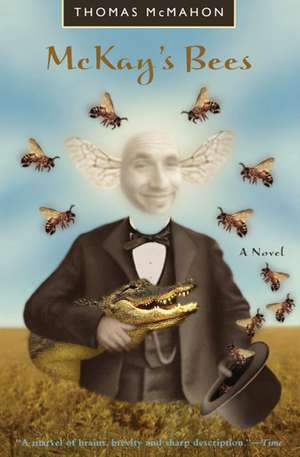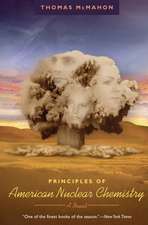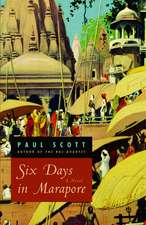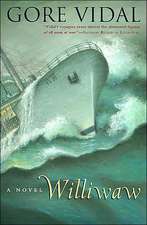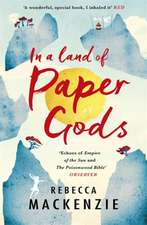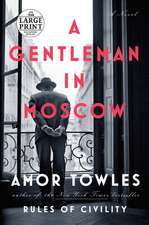McKay's Bees: A Novel: Phoenix Fiction
Autor Thomas McMahonen Limba Engleză Paperback – 15 oct 2003
Moving from Massachusetts to Kansas in 1855 with his new wife and a group of German carpenters, Gordon McKay is dead set on making his fortune raising bees—undaunted by Missouri border ruffians, newly-minted Darwinism, or the unsettled politics of a country on the brink of civil war.
Din seria Phoenix Fiction
-
 Preț: 212.73 lei
Preț: 212.73 lei -
 Preț: 115.75 lei
Preț: 115.75 lei -
 Preț: 162.47 lei
Preț: 162.47 lei -
 Preț: 94.06 lei
Preț: 94.06 lei -
 Preț: 118.44 lei
Preț: 118.44 lei -
 Preț: 109.54 lei
Preț: 109.54 lei -
 Preț: 86.43 lei
Preț: 86.43 lei -
 Preț: 144.19 lei
Preț: 144.19 lei -
 Preț: 138.23 lei
Preț: 138.23 lei -
 Preț: 149.37 lei
Preț: 149.37 lei -
 Preț: 188.97 lei
Preț: 188.97 lei -
 Preț: 201.65 lei
Preț: 201.65 lei -
 Preț: 267.90 lei
Preț: 267.90 lei -
 Preț: 197.83 lei
Preț: 197.83 lei -
 Preț: 246.90 lei
Preț: 246.90 lei -
 Preț: 199.52 lei
Preț: 199.52 lei -
 Preț: 199.52 lei
Preț: 199.52 lei -
 Preț: 216.79 lei
Preț: 216.79 lei -
 Preț: 233.29 lei
Preț: 233.29 lei -
 Preț: 263.78 lei
Preț: 263.78 lei -
 Preț: 201.47 lei
Preț: 201.47 lei -
 Preț: 241.95 lei
Preț: 241.95 lei -
 Preț: 229.04 lei
Preț: 229.04 lei - 16%
 Preț: 137.20 lei
Preț: 137.20 lei - 20%
 Preț: 147.67 lei
Preț: 147.67 lei - 18%
 Preț: 133.64 lei
Preț: 133.64 lei - 20%
 Preț: 129.56 lei
Preț: 129.56 lei - 18%
 Preț: 152.10 lei
Preț: 152.10 lei - 18%
 Preț: 131.88 lei
Preț: 131.88 lei - 20%
 Preț: 141.28 lei
Preț: 141.28 lei - 19%
 Preț: 148.39 lei
Preț: 148.39 lei - 19%
 Preț: 148.93 lei
Preț: 148.93 lei - 18%
 Preț: 131.88 lei
Preț: 131.88 lei - 18%
 Preț: 151.60 lei
Preț: 151.60 lei
Preț: 217.38 lei
Nou
Puncte Express: 326
Preț estimativ în valută:
41.59€ • 43.43$ • 34.43£
41.59€ • 43.43$ • 34.43£
Carte tipărită la comandă
Livrare economică 04-18 aprilie
Preluare comenzi: 021 569.72.76
Specificații
ISBN-13: 9780226561110
ISBN-10: 0226561119
Pagini: 288
Dimensiuni: 133 x 203 x 18 mm
Greutate: 0.25 kg
Ediția:1
Editura: University of Chicago Press
Colecția University of Chicago Press
Seria Phoenix Fiction
ISBN-10: 0226561119
Pagini: 288
Dimensiuni: 133 x 203 x 18 mm
Greutate: 0.25 kg
Ediția:1
Editura: University of Chicago Press
Colecția University of Chicago Press
Seria Phoenix Fiction
Notă biografică
Thomas McMahon (1943 1999) was the Gordon McKay Professor of Applied Mechanics and professor of biology at Harvard University. He is the author of Loving Little Egypt and Principles of American Nuclear Chemistry, both published by the University of Chicago Press, as well as the posthumous novel, Ira Foxglove..
Recenzii
"A literary miracle--a tale defying gravity and all manner of other rules that ground the narratives of most storytellers."
"Exhilarating...warmed by a tender sensuality."
"Humorous and generous yet sometimes disconcertingly fatalistic, McMahon's storytelling is based on an irresistible curiosity about how the world works.... His narratives are full of colorful background detail and impulsive detours; they're equally respectful of human dedication and nature's haphazard way of bestowing rewards and punishments. In keeping with this freewheeling spirit, McMahon has a style that manages to animate not only the people in a novel but its objects and landscapes."
"[McMahon's novels] combine sophisticated scientific lore with a well-developed sense of human-ness. They are learned, funny, spiritual, and sexy. It would not be disgraceful to compare them with the work of Gabriel Garcia Marquez. Indeed, McMahon is a kind of Yankee magic realist, mixing the fantastic with the ordinary so seamlessly that one can't finally decided which is which--the search for nature's secrets and the search for love prove equally intoxicating. Written largely in a plain style--the prose soars only when a character is drunk on the pursuit of scientific truth--they are deceptively light, a cabinet of wonders and of spirit."
"McMahon, in such a short novel, should not have been able to bring coherence out of Darwin and Lincoln, bees and machines, East and West, honey and blood. . . . That he manages—that wit, irony, gentleness, passion, and knowledge conspire so successfully—is a wonder of craft."
"Not one of the characters is a stereotypical scientist. Science itself informs the descriptions that run through the novel, and in this regard McMahon is at his most original."
"Truly a gem—an elegantly simple construct full of light and surprise."
"An impressively original novel. . . . McKay's Bees is comic in its vision, at the same time serious, constantly surprising in its twists of plot and its reflections upon life, by a writer with a voice uniquely his own."
"[McMahon] is so much less well known than he deserves to be. His later novels, increasingly wry and exaggerated, bear a family resemblance to those of Kurt Vonnegut and to certain of Saul Bellow's works. Yet there is an underlying sweetness to McMahon's writing, a wholehearted engagement with those elements of scientific wonder that most resemble artistic creativity."
